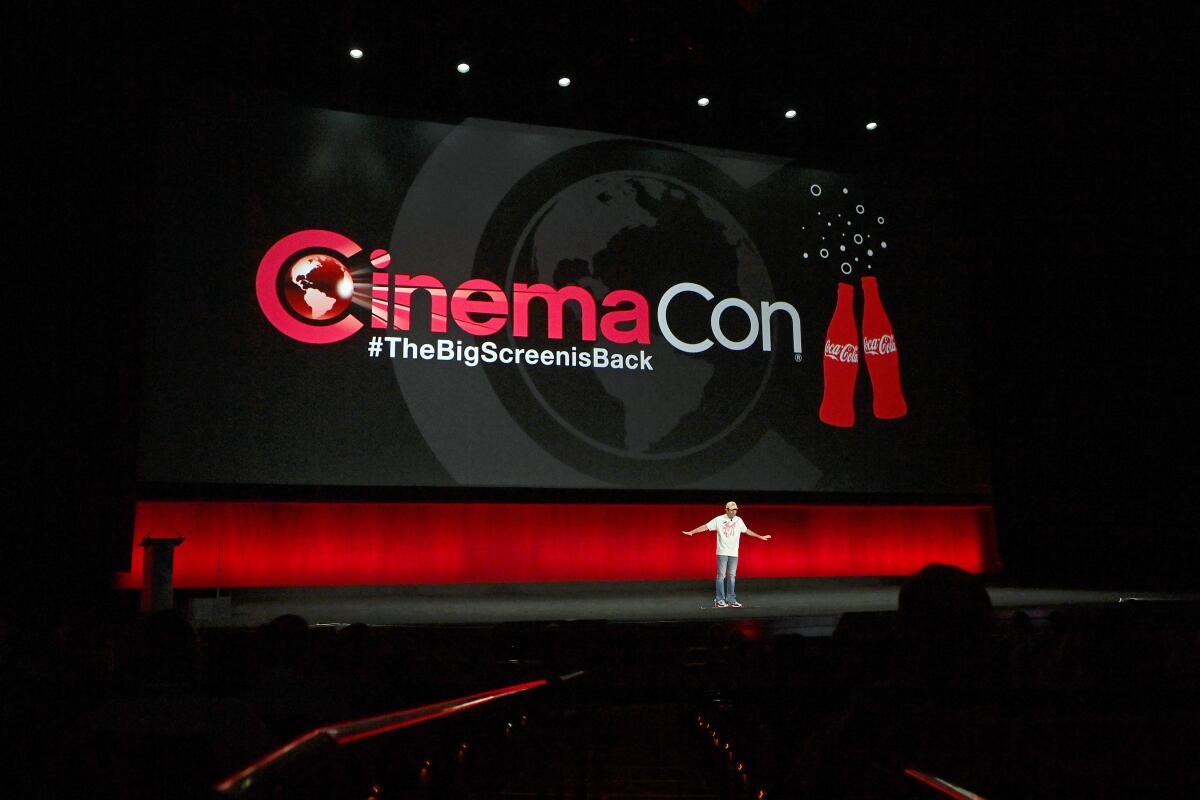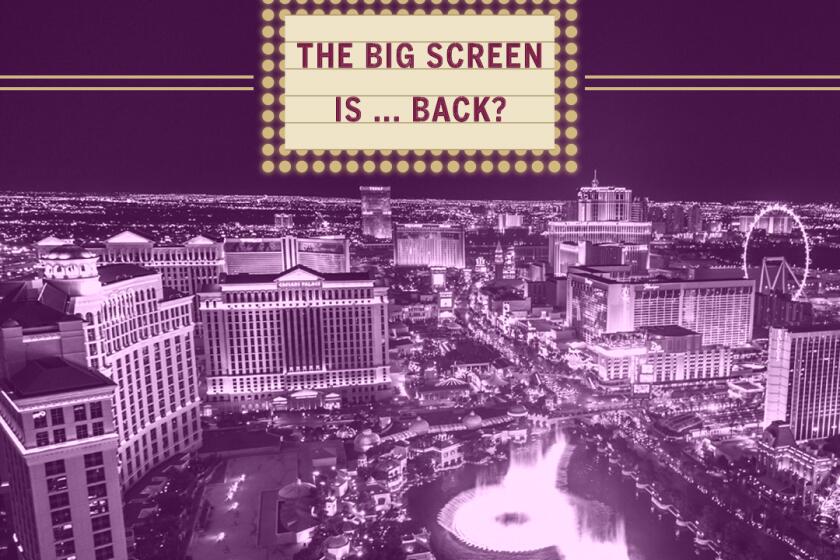Theaters’ plea to Hollywood: ‘Show movies in movie theaters first’

- Share via
A lot has changed in the movie business since two and a half years ago, the last time movie theater owners and Hollywood studio executives gathered in Las Vegas for CinemaCon, the annual film business convention.
Amid a resurgent COVID-19 pandemic, this year’s festivities aren’t expected to have the star power of previous CinemaCons when distributors would fly in their most famous actors to wow theater chain operators, ranging from global circuits to regional mom-and-pops.
Inside the business of entertainment
The Wide Shot brings you news, analysis and insights on everything from streaming wars to production — and what it all means for the future.
You may occasionally receive promotional content from the Los Angeles Times.
One thing hasn’t shifted: the theater industry’s insistence that, despite the rapid rise of streaming and video on-demand, movies must be shown on the big screen before they go to the home.
“There’s only one way to create a billion-dollar franchise,” said Adam Aron, chief executive of the world’s largest circuit AMC Theatres in remarks from the Colosseum stage at Caesars Palace on Tuesday. “Show movies in movie theaters first.”
Multiplexes have plenty of reason to push this agenda. For decades, the so-called theatrical window, whereby studios agree to play films exclusively in theaters for weeks before they hit home video outlets, has been a sacrosanct business model.
But the coronavirus health crisis, which closed the world’s cinemas for months and continues to tamp down attendance, ushered in a wave of experimentation by distributors.
CinemaCon kicks off in Las Vegas at the weirdest possible time for the movie business. Plus: Rachel Maddow stays with MSNBC.
In the most disruptive example, Warner Bros. sent its 2021 flicks to sister streaming service HBO Max for no extra charge, including “Godzilla vs. Kong” and “Mortal Kombat.” Comcast’s Universal Pictures and ViacomCBS’ Paramount Pictures have experimented with simultaneous releases for, respectively, “The Boss Baby: Family Business” on Peacock and “Paw Patrol: The Movie” on Paramount+.
Walt Disney Co. dropped Pixar’s “Luca” on Disney+ and debuted other movies on the streamer at the same time as theaters for $30. That strategy sparked a lawsuit from “Black Widow” star Scarlett Johansson, who accused Disney of cheating her out of box office bonuses with its release plan. Disney said her case has no merit and is trying to compel arbitration.
Scarlett Johansson and Walt Disney Co. are locked in a legal fight and war of words over “Black Widow’s” online release. It’s the latest flashpoint where talent pay practices have yet to catch up to broader industry changes.
Though movies have driven millions of subscribers to Disney+ and HBO Max, both top priorities for their parent companies, CinemaCon’s message to studios is that hybrid release strategies aren’t working. Theaters argue that the hybrid releases eat into the box office and encourage rampant piracy.
“Let us be clear about one thing, today. Simultaneous release does not work. It doesn’t work for anyone,” said John Fithian, president and CEO of the National Assn. of Theatre Owners, the trade group that represents cinemas. “Theatrical windows won’t be what they were before, but they can’t be what they were in the pandemic.”
There are some signs that studios are already moving away from the same-day release model as the industry tries to recover. Many are sticking with a window of roughly 30-45 days, though that’s far shorter than the 90-day window theaters were used to before COVID-19. Following that model, Disney on Sept. 3 will release Marvel’s “Shang-Chi and the Legend of the Ten Rings” to theaters exclusively. Its latest movie, “Free Guy,” opened in theaters only and held up considerably better than others in its second week at the box office.
Warner Bros. and AMC recently struck a deal for a 45-day exclusive theatrical window for its movies starting next year. But while Warner Bros. has committed to cinema-first for its theatrical movies, the Burbank studio plans to send 10 of its 2022 movies, or about half of its scheduled pics, directly to HBO Max with no theatrical release at all.
CinemaCon is more subdued this year compared with previous iterations, despite Regal Cinemas sending a 500-person contingent of employees, including general managers from around the country, to the festivities. Disney opted not to send executives or talent. The Delta variant of the coronavirus has tamped down moviegoers’ comfort with returning to indoor auditoriums in recent weeks, according to polling from NRG.
Still, exhibitors found reasons to cheer as studios began to present trailers and footage from movies they plan to release in the fall and in 2022. MGM Studios motion picture group Chairman Michael De Luca on Tuesday confirmed that the next James Bond movie, “No Time to Die,” will finally be released in the U.S. in October after multiple delays.
“There is no industry without you, there is no Hollywood without you,” De Luca told the crowd of theater owners. MGM has held back its biggest movies, including Bond, for theaters until theatrical releases were financially feasible.
The CinemaCon program came with some mixed messaging, though. After cinema executives extolled the importance of exclusive releases, the first movie MGM spoke about was “The Addams Family 2,” an animated movie that will be available on premium video on-demand once it hits theaters. MGM’s presentation, its first at CinemaCon in years, comes as Amazon is buying the studio for $8.45 billion, pending regulatory approval.
Theater owners applauded Sony Pictures executives, including Motion Picture Chair Tom Rothman, for kicking off the event Monday night with an impassioned defense of theatrical windows. (Sony is the only major movie studio without a big, affiliated streaming service.) Sony also surprised attendees with a new trailer for “Spider-Man: No Way Home” and a full screening of “Ghostbusters: Afterlife.”
Measuring streaming success is a problem for talent.
However, Sony has sold multiple movies to streaming services during the pandemic. The Culver City studio is reportedly in talks to sell “Hotel Transylvania 4” to Amazon.
Multiple executives acknowledged the grueling year and a half that the entertainment industry has weathered.
Film distribution veteran Erik Lomis, of United Artists Releasing, channeled Rocky Balboa: “Life ain’t about how hard you can hit. It’s about how hard you can get hit and keep moving forward.”
This year’s CinemaCon may not be in the same weight class as previous outings. But theaters are eager to prove they are fit to stay in the ring.
More to Read
Inside the business of entertainment
The Wide Shot brings you news, analysis and insights on everything from streaming wars to production — and what it all means for the future.
You may occasionally receive promotional content from the Los Angeles Times.














